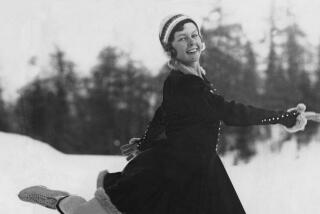Winning a Medal Could Put This Memory on Ice
- Share via
NAGANO, Japan — The accident occurred more than two years ago, yet the effects can still be seen during Elena Berezhnaya’s practice sessions with her figure skating partner, Anton Sikharulidze.
Cautiously, they practice their side-by-side camel spins, Sikharulidze giving Berezhnaya an extra-wide berth. As they spin, they keep their distance, staying out of harm’s way, careful not to get too close.
This is because Berezhnaya still skates with the horrific memory of Jan. 9, 1996, when her previous partner, Oleg Sliakhov, sliced Berezhnaya in the head with the blade of his skate while performing the same side-by-side spin.
The blade slashed the side of Berezhnaya’s head, penetrating her skull. A day later, Berezhnaya underwent surgery to remove bone debris from the wound. She remained hospitalized for a month.
For six months, she was bothered by a variety of motor-skill problems, from slurred speech to the inability to write complete words. She eventually required therapy.
Berezhnaya weathered the accident, resuming skating in the fall of 1996, but her partnership with Sliakhov did not. Berezhnaya was fearful of skating again with Sliakhov, who hadn’t intentionally struck Berezhnaya but wasn’t as careful as he could have been, according to the pair’s coach, Tamara Moskvina.
Looking for a partner she could implicitly trust, Berezhnaya chose her boyfriend, Sikharulidze, a two-time world junior pairs champion.
At the time, Berezhnaya was 19, Sikharulidze 20. In their native Russia, where skaters are often groomed as pairs at grade-school age, Berezhnaya and Sikharulidze were starting laps behind the pack.
Within six months, however, they were bronze medalists at the 1997 European championships.
Within 18 months, they were European gold medalists.
And Tuesday, they are within 4 1/2 minutes of an Olympic medal--gold if they outskate Russian rivals Oksana Kazakova and Artur Dmitriev and Germans Mandy Woetzel and Ingo Steuer in the long program.
Berezhnaya and Sikharulidze are third after Sunday’s short program, despite Sikharulidze’s routine-opening fall while performing side-by-side triple toeloops.
The ranking--placing them ahead of U.S. teams Kyoko Ina-Jason Dungjen (fourth place) and Jenni Meno-Todd Sand (sixth)--is testimony to the power and speed with which Berezhnaya and Sikharulidze skate. After the fall, their technical scores were predictable--5.4 to 5.6--but they received three marks of 5.9 and six marks of 5.8 for presentation.
Peter Burrows, who coaches Ina and Dungjen, cried robbery, but Moskvina defended the scores when asked if she believed her skaters deserved to be in third place.
“I don’t need to believe,” Moskvina said, “because nine judges said they deserve third. It is not my job to judge judges. I teach skaters to skate well.”
Berezhnaya was in tears after Sikharulidze’s fall, and Sikharulidze was surly when asked about his mistake by reporters, but Moskvina defended her skaters by taking the offensive.
“I think you would be upset too if your camera was broken,” Moskvina told reporters.
“He’s a human being. He wants to jump well. He wants to do his best. We are all people, and he couldn’t manage.
“This is sport and we have to accept it. That is why people struggle to be the best, struggle to improve.”
As on-ice calamities go, Berezhnaya has seen much, much worse, and overcome the same.
In the grand scheme of the past two years, what’s one pratfall fall on a slab of Japanese ice?
(BEGIN TEXT OF INFOBOX / INFOGRAPHIC)
Pairs Figure Skating
Russian Rule-ette
In Pairs figure skating, the last nine gold medals hve been won by teams from Russia. In fact, Russia has been so dominant that the last time even one of the 10 Olympic judges placed a non-russian pair first was in 1984. Russia holds the Winter Olympic record for most consecutive victories in a single event.
*
Scoring:
Short program: (length of program) 2:40 (max), (% of final score) 33.3
Free program: (length of program) 4:30 (+:10), (% of final score) 66.7
*
Medals:
Russia-Soviet Union: 9 (gold), 6 (silver), 1 (bronze), 16 (total)
Germany: 3, 2, 1, 6
Canada: 1, 1, 4, 6
Austria: 2, 2, 1, 5
U.S.: 0, 3, 2, 5
Hungary: 0, 1, 4, 5
E. Germany: 0, 1, 3, 4
France: 2, 0, 1, 3
Britain: 0, 1, 2, 3
Finland: 1, 1, 0, 2
Belgium: 1, 0, 0, 1
Norway: 0, 1, 0, 1
*
Standings:
Kazakova-Dmitriev, Russia: 0.5*
Wotzel-Steuer, Germany: 1.0
Berezhnaya-Sikharulidze, Russia: 1.5
Ina-Dungjen, United States: 2.0
Yeltsova-Bushkov, Russia: 2.5
Meno-Sand, United States: 3.0
Abitbol-Bernadis, France: 3.5
Xue-Hongbo, China: 4.0
Schwarz-Muller, Germany: 4.5
Zagorska-Siudek, Poland: 5.0
Sargeant-Wirtz, Canada: 5.5
Savard-Bradet, Canada: 6.0
*Factored placings
More to Read
Go beyond the scoreboard
Get the latest on L.A.'s teams in the daily Sports Report newsletter.
You may occasionally receive promotional content from the Los Angeles Times.






